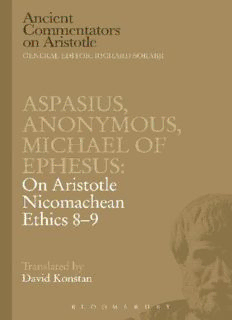Table Of ContentASPASIUS
On Aristotle Nicomachean Ethics 8
with
ANONYMOUS
Paraphrase of Aristotle Nicomachean Ethics 8 and 9
and
MICHAEL OF EPHESUS
On Aristotle Nicomachean Ethics 9
This page intentionally left blank
Commentators on Aristotle on Friendship
ASPASIUS
On Aristotle
Nicomachean Ethics 8
with
ANONYMOUS
Paraphrase of Aristotle
Nicomachean Ethics 8 and 9
and
MICHAEL OF EPHESUS
On Aristotle
Nicomachean Ethics 9
Translated by David Konstan
LONDON • NEW DELHI • NEW YORK • SYDNEY
Bloomsbury Academic
An imprint of Bloomsbury Publishing Plc
50 Bedford Square 1385 Broadway
London New York
WC1B 3DP NY 10018
UK USA
www.bloomsbury.com
First published in 2001 by Gerald Duckworth & Co. Ltd.
Paperback edition first published 2014
© David Konstan, 2001
David Konstan asserts his right under the Copyright, Designs and Patents Act, 1988,
to be identified as Author of this work.
All rights reserved. No part of this publication may be reproduced or transmitted
in any form or by any means, electronic or mechanical, including photocopying,
recording, or any information storage or retrieval system, without prior
permission in writing from the publishers.
No responsibility for loss caused to any individual or organization acting on or refraining from action as a
result of the material in this publication can be accepted by Bloomsbury Academic or the author.
British Library Cataloguing-in-Publication Data
A catalogue record for this book is available from the British Library.
ISBN HB: 978-0-7156-3071-6
PB: 978-1-7809-3910-0
ePDF: 978-1-7809-3909-4
Acknowledgements
The present translations have been made possible by generous and imaginative funding from the
following sources: the National Endowment for the Humanities, Division of Research Programs, an
independent federal agency of the USA; the Leverhulme Trust; the British Academy; the Jowett Copyright
Trustees; the Royal Society (UK); Centro Internazionale A. Beltrame di Storia dello Spazio e del Tempo (Padua);
Mario Mignucci; Liverpool University; the Leventis Foundation; the Arts and Humanities
Research Board of the British Academy; the Esmée Fairbairn Charitable Trust; the Henry
Brown Trust; Mr and Mrs N. Egon; the Netherlands Organisation for Scientific Research (NWO/GW).
The editor wishes to thank Joseph G. DeFilippo, Hélène Longpré, Vasilis Politis, Michael Trapp,
Jan Szaif, Ruth Webb and Stephen White for their comments and Robbert M. van den
Berg and Han Baltussen for preparing the volume for press.
Typeset by Ray Davies
Printed and bound in Great Britain
Contents
Conventions vii
Introduction 1
Aspasius: On Aristotle
Nicomachean Ethics 8
Textual Emendations 12
Translation 13
Notes 45
English-Greek Glossary 49
Greek-English Index 53
Index of Names 57
Anonymous: Paraphrase of Aristotle
Nicomachean Ethics 8 and 9
Textual Emendations 60
Translation 61
Notes 115
English-Greek Glossary 119
Greek-English Index 124
Index of Names 130
Michael of Ephesus: On Aristotle
Nicomachean Ethics 9
Textual Emendations 133
Translation 135
Notes 215
English-Greek Glossary 221
Greek-English Index 226
Index of Names 232
Subject Index 233
This page intentionally left blank
Conventions
[] Square brackets enclose words or phrases that have been added to
the translation or the lemmata for purposes of clarity.
<> Angle brackets enclose conjectures relating to the Greek text, i.e.
additions to the transmitted text deriving from parallel sources
and editorial conjecture, and transposition of words or phrases.
Accompanying notes provide further details.
() Round brackets, besides being used for ordinary parentheses,
contain transliterated Greek words and Bekker page references to
the Aristotelian text.
* Lemmata are marked with an asterisk when they are not distin-
guished as such in Heylbut’s text, but appear as part of the
commentary.
To Khachig
Introduction
The eighth and ninth books of Aristotle’s Nicomachean Ethics are devoted
to an analysis of philia, a subject that Aristotle also treats in the
Eudemian Ethics (Book 7) and the Magna Moralia (Book 2).1 That Aris-
totle’s is the most sustained and profound discussion of philia to survive
from Greek antiquity is beyond question. It is equally clear that philia is
one of the fundamental value terms in classical Greek. Given that this is
so, it is the more remarkable that there is still no consensus on what philia
means, or even how to render it in English.
The surviving ancient and medieval Greek commentaries on these
books of Aristotle’s Nicomachean Ethics, translated in this volume, pro-
vide invaluable evidence as to how Aristotle’s arguments were received in
the philosophical schools that flourished in the centuries after Aristotle
wrote. They also illuminate important aspects of Aristotle’s treatment of
philia, and shed light on what the concept might have meant to a writer
of Greek in late antiquity. The commentaries do not, however, entirely
resolve the perplexities attaching either to the term philia itself or to
Aristotle’s discussion of it; and they introduce some further interpretative
problems of their own (consider, for example, Aspasius’ effort (181,24-
182,3) to turn Aristotle’s words, ‘a democracy is least wicked’ (1160b19-20),
into their opposite, ‘democracy is worse than the others’, in conformity
with his own preference for monarchy). All of which is to the good,
inasmuch as it encourages further thought on the nature of philia.
All English translations of Aristotle’s Ethics with which I am familiar
render the term philia as ‘friendship’ (translations into other modern
languages typically employ amicizia, amistad, amitié, Freundschaft, and
the like). On occasion, in the versions that follow, I do so as well. More
often, however, I translate philia as ‘love’. I believe that this is the core
sense of the Greek word, and that even when it is applied, as it frequently
is, to the relationship between friends (philoi), it primarily denotes the
affection that obtains between them, and may properly be rendered as
‘love’ in these contexts as well. In some cases, the word ‘friendship’ is
obviously absurd as an equivalent to philia, for example, when Aristotle
speaks of a mother’s philia for her infant child, and retaining ‘friendship’
makes Aristotle’s arguments sound odd or nonsensical. In other cases,
however, as in the affection that may arise between commercial partners,
it sounds strange to speak of love, and I have bowed to the necessity of

